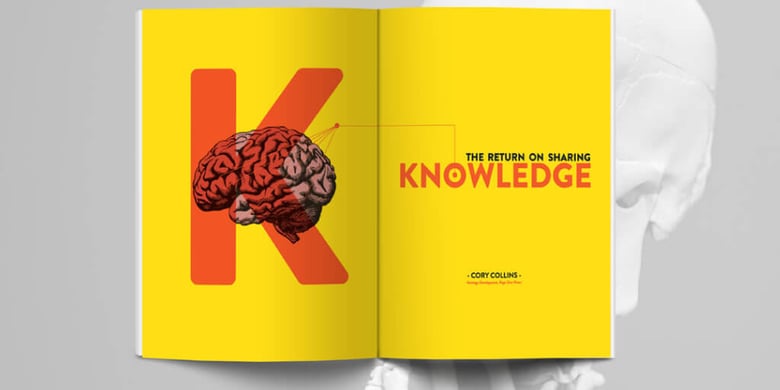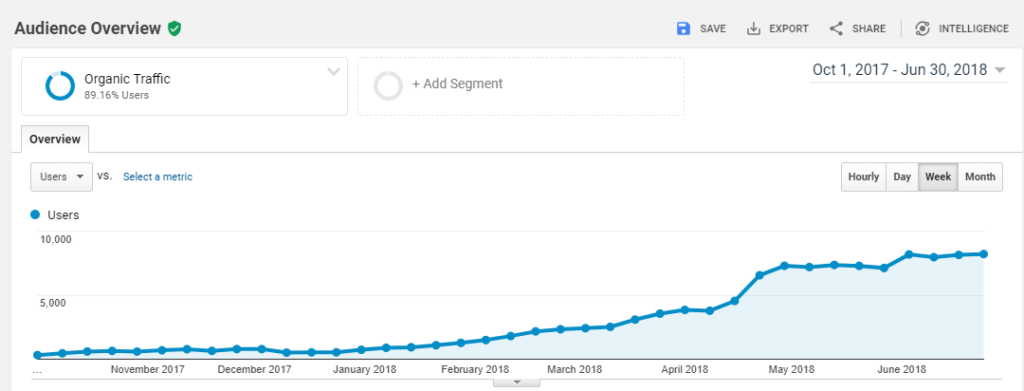 Measurability is an oft-repeated buzzword in digital marketing. The ability to discreetly measure the impact and success of our work, and even ROI, is the differentiator we love to tout over our more traditional marketing brethren.
Measurability is an oft-repeated buzzword in digital marketing. The ability to discreetly measure the impact and success of our work, and even ROI, is the differentiator we love to tout over our more traditional marketing brethren.
Everything can and should be measured. Right?
In SEO this takes many forms: tracking website changes, links built, keyword rankings, position fluctuations, clicks, impressions, CTR, organic pageviews, sessions, users. Time on page, pages per session, scroll depth, goal completions...and on and on the list goes.
The truth is, this much data can be more noise than signal. Data overload leads to short term and short-sighted decisions. It becomes a race to make the data move in the way we predict and want, with goals and KPIs chased fervently instead of investing in long-term, business-impacting change.
I love data-backed decisions just as much as everyone else in the industry, but often times the most optimal changes within a business won’t be the ones that effect KPIs the fastest.
The work I love the most, the work that brings me the most personal satisfaction and joy, is affecting meaningful change within an organization.
As an agency — often perceived as a partner at best, or a vendor at worst — change is rarely done through the work we execute ourselves. It’s achieved through great communication, clear consultation, well-documented work, and ongoing education. My goal is always to help a client internally achieve meaningful, institutional growth and empower them to succeed in search on their own, without oversight.
This is one such story.
The Background
In October 2017, the strategy department of Page One Power was retained by a client who had launched six months prior in the finance niche and was struggling to find a foothold.
We were helping build links back to their site, but they were struggling to see the results they expected and needed.
The client had identified organic search as a primary channel for growth and audience development, yet were only somewhat successful in creating content that stuck within a SERP. After analysis, it was clear success was haphazard and a result of quality work accidentally targeting a SERP well, as opposed to strategically targeting specific SERPs with good work. They were producing 50 pages per month, with roughly 250 pages already published. Despite this, virtually all organic search traffic went to a handful of pages, ranking for terms only somewhat-relevant to their goals.
The client had thorough — really, really thorough — audience research with a primary topic of focus, complete with well-developed personas across multiple demographics to ensure audience value in every piece they created. And the content was quality. Nothing was thin, off-topic, or lacking in audience value.
The issue was that the content was broad and generalized, with little research to identify keyword themes, searcher intent, ranking competitors, or any of the other typical work that goes into creating optimized content to rank for a desired SERP.
Disclaimer: I often say “rank for a desired SERP”, but what I really mean is an entire category of keywords, both long tail and head term, with the most competitive SERP representing the entire category of keywords. Basically, if you can rank for the most competitive head term, you should rank well for the rest of the keyword variations and themes with decent on-page optimization.
After interviewing the client and reviewing goals, expectations, and work-to-date, the partnership proved promising: they had the budget for a long-term campaign, belief in search as a channel, and a willingness to invest in quality content.
Despite this, long-term success wasn’t certain.
The financial space is extremely, extremely competitive. And not just for the obvious terms surrounding credit cards, personal loans, mortgage calculators, debt consolidation, financial planning, etc. Even outside these head terms, there are many different sites and organizations invested in creating quality content at scale, with the intent to answer nearly any question a person might have. And these are large, established, and dominant brands such as The Balance, NerdWallet, Investopedia, Credit Karma, and more.
The client was aware of the inherent challenge within the niche, and willing to invest the time, energy, and resources necessary. Expectations were reasonable, but they needed a clear strategy to find a foothold in search. Specifically, they needed to demonstrate an ability to rank in relevant SERPs and grow traffic month-over-month, or continued investment would be at risk. The runway to success wasn’t forever.
Their mistake was simple: they failed to consider how the pages they were creating would be found within search, and had only focused on their personas and audience. They needed to better understand searcher behavior, and identify winnable SERPs where existing content ranking for relevant searches could be displaced.
This was the institutional change I sought to affect.
The Change
Page One Power specializes in link building through manual promotion and content creation. We also offer keyword research, technical SEO, and content audits. The client contracted Page One Power with two specific goals:
- Improve their content strategy to more consistently create pages that would rank for meaningful keywords and drive traffic.
- Create a systematic approach to identify which pages were best suited for link building and which pages were most likely to need links in order to earn rankings and traffic.
Content quality wasn’t the issue; they were struggling to produce content that targeted a specific keyword and query with a realistic chance to rank.
I see it often in my work with clients: a team of savvy content creators lack the SEO insight to successfully create content that ranks. The mistake is the level of detail and granularity of the content — it’s overgeneralized, with the expectation that “understanding an audience” means you simply add a keyword, and you then have content that will rank.
The truth is, search content requires research before creation. It’s important to identify a top-level keyword to target, the natural variation and themes involved, which domains currently rank, how the pages are formatted, the overall quality of the information, what topics they cover, whether or not they miss a piece of searcher intent, and how many links are involved. Basically, the goal is to find a gap in terms of information offered to searchers, create a better page than currently exists, and determine how many links are needed to reasonably expect to rank.
For example, the client had consistently plugged [credit score] into their Yoast SEO plugin, even though they knew it was beyond their means, but hadn’t looked at more granular and modified versions. They were aiming each page at the same head term, rather than answering distinct and exact-match queries.
Despite the validity of the topic, they had no reasonable opportunity to rank for [credit score] in the short term, nor did it make sense to create multiple (20 or so) pages that all theoretically target the head term [credit score]. Sure, in practice they were targeting variations and modified versions of the term — but to them, their page was most relevant to the head term [credit score].
My plan was straightforward:
- Perform a content audit to analyze existing content.
- Present the content audit to the client’s head of content (HoC) and train him on SEO and keyword research.
- Optimize existing pages using the content audit with the HoC.
- Work personally with the HoC on the next wave of content planning to identify winnable SERPs.
- Continue to run a monthly content audit (maintenance) and work with HoC to ensure continued success and education.
- Occasionally research and hand-deliver opportunities to ensure continued growth and education.
The first step was simple: I performed a content audit and worked with the client to analyze which pages were successful, which pages missed the mark, and which pages were close, but used the wrong keywords. I presented the analysis so they understood why certain pages were successful, why others were not, and how to optimize existing pages to improve.
Next, I helped the head of content work through revisions of existing content, with the intent to improve their targeting and optimization for terms they were almost ranking on page one. Although the revisions were only somewhat successful, it was an extremely valuable moment in helping their head of content truly understand keyword research and its role in content designed for search.
I worked through the plan and documentation with the head of content, but I wanted the client to be invested and understand why we were making specific changes so everyone could better understand the difference between targeted, optimized content and well-written, unoptimized content.
They went back through and performed the keyword research necessary to optimize the pages for the correct keyword themes and variations.
Lastly, I put the content audit in maintenance mode, meaning I continued to pull data for content performance month-over-month for new and existing pages, meeting with the head of content to review performance once per month. Within the process I would occasionally uncover an opportunity myself (digging through Search Console and competitor content), and I delivered those opportunities in our monthly meeting.
The Results
The client went from struggling in search to consistently making search-focused content able to rank very well for their intended keywords.
Within two months, they evolved from performing the barest of keyword research that grasped at unattainable head terms, to performing deep keyword research which identified topical clusters and gaps in SERPs. Their content consistently answered granular questions immediately and provided deeper, additional context below.
They’ve been a tremendous partner and I’m exceedingly humbled to see their continued growth. We’re working on a new phase of strategy now, and without a doubt the most pride I take isn’t the ROI of our services, the keywords they rank well for, or even the up-and-to-the-right organic traffic growth on the website.
I’m most proud of the internal growth and improvement their own organization attained, and the fact that if I were to walk away now they could easily carry on creating content that drives organic traffic. I’ve done more than deliver excellent work: I’ve helped them create an excellent system to achieve repeatable success.
Optimization is at my very heart, and it’s much more optimal to teach others than to do the work for them. That’s how true growth is achieved.
The organic traffic is fun to look at, though.


